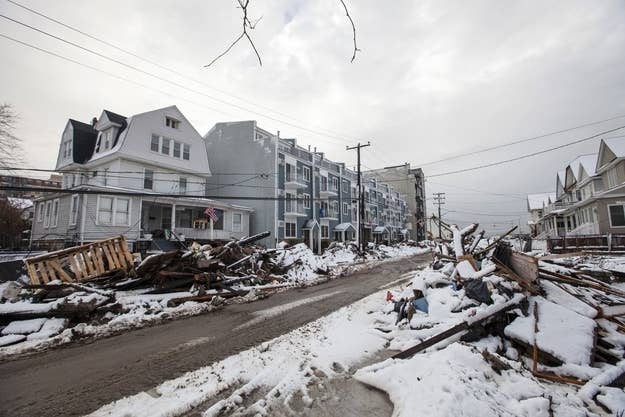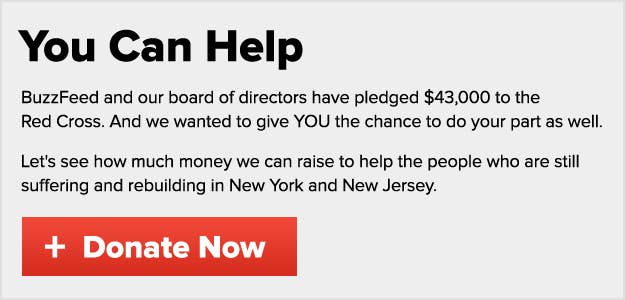
For a mother of five evacuated from public housing in Far Rockaway, New York, Hurricane Sandy posed a special concern. She's a survivor of domestic violence, and the storm affected many in her situation especially deeply.
Not only were many domestic violence shelters temporarily incapacitated by the hurricane, but many survivors who live on their own were cut off from homes, jobs, and city services. It's not immediately clear how many survivors were displaced, but with estimates of displaced people reaching as high as 40,000, the number is likely significant. Many more are feeling the storm's other effects — over 100,000 people were still without power two weeks after the storm, and gas shortages and public transit outages have made it hard to get around. Experts say the disruptions of Sandy may put survivors at risk of going back to their abusers.
The Far Rockaway mom was one client of Sanctuary for Families, a New York nonprofit that operates five shelters and also provides career, legal, and counseling services for over 10,000 survivors of domestic violence living throughout the city. Laurel Eisner, Sanctuary's executive director, says that none of their shelters lost power during the storm, but many of their clients who don't live in shelters have been evacuated from their homes or unable to get to their jobs.
These can pose especially big problems for domestic violence survivors — since abusers often try to isolate their victims, they may not have many friends or family members to turn to. And staying with family members may not always be safe, since abusers may know where they live.
Many abusers also try to keep their partners from working, so "once they leave, they have to find a way to make do in the world of work, and their relationship to their jobs is so critical" for financial stability and for healing. For many, the storm has jeopardized that relationship. And abuse survivors who are in dire economic straits are at increased risk of returning to their abusers — says Eisner, "We always worry that they'll feel like, I'm going to be out on the street with my kids, so I'm just going to have to go back to him."
The storm also affected services for survivors. Liz Roberts, chief program officer of Safe Horizon, the agency that operates New York City's domestic violence hotline, says problems with phone service during the storm led to hotline outages (Safe Horizon responded by circulating a new number). People who wanted to come to shelters may also have encountered transportation problems while the subways were down — and while shelters could initially send car services, that become harder when the gas shortage hit. "There were definitely survivors who were in danger and whose danger was exacerbated by the storm," Roberts says.
Two of Safe Horizon's nine shelters in the city lost power, one for a week and one for two and a half days — they housed a total of 60 people, including a newborn. Those in the shelter who lost power for a week were evacuated to another safe location.
The storm may also have affected people's plans to leave abusive partners — Roberts notes that Safe Horizon helps New Yorkers in public housing secure a transfer to a different public housing complex to get away from an abuser. But with much public housing without power, many of those transfers were delayed. (Mayor Bloomberg announced yesterday that power was back on in all New York City public housing, but some buildings still lack hot water, heat, or reliable elevators.)
Roberts adds: "When somebody is dealing with abuse and making a plan for their life, their ability to act on that plan takes a certain kind of confidence and courage, and when the world seems like a very uncertain and unpredictable place, which a storm like this can make it seem, finding that courage and confidence is that much harder."
She also cautions that the hurricane could put people still living with abusers at greater risk; like economic hardship, the stress of the storm could make abusers more violent.
Shelters throughout New Jersey were hit as hard as, or even harder than, those in New York. Patricia Sly, executive director of Jersey Battered Women's Service, says the organization's shelter and transitional living facility both lost power, the latter for 11 days. Staff evacuated residents to another secure location and they're now back, but the storm has taken an emotional toll. While a natural disaster "is not the same type of trauma as being a victim of violence, it brings up the stresses and the memories. It can be particularly harsh on people who have been victimized in the past."
Elin Stebbins Waldal, author of a memoir about her own experience with relationship violence, says that survivors of abuse may already have had to reinvent their lives — moving, finding new jobs, maybe even changing their names to keep their abusers from finding them. Something like Hurricane Sandy, which displaced some survivors yet again, "could bring back a whole slew of emotions like, I've already been through this!" And victims of domestic violence can find that their home is the most dangerous place for them — after leaving and creating a new, safe home, to lose that place as well could be devastating.
But, she says, survivors who have been able to leave may be able to "lean on some of those things that helped them get to where they are today" in recovering from the storm. "When you've really gotten to that other side," says Waldal, "you know your resilience."
The mom from Far Rockaway and her five children have been able to stay with relatives, says Laurel Eisner. But she hasn't been able to get to her job, or back to her home. Like many, Eisner is concerned about how New York City will find affordable homes for the thousands of people displaced by Hurricane Sandy: "For our clients that are now in shelters, I don't know how they're going to find housing," she says. "It's been a scary week, and it's very worrisome what happens next."


